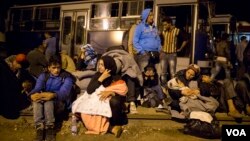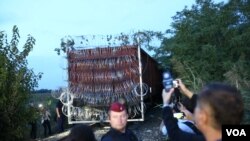The small Hungarian border village of Röszke was awash with activity the night before the country promised to crack down on illegal border crossings by migrants. Sometime between 7:30 and 7:45 pm local time Monday, a locomotive brought a single car, with barbed wire wrapped at one end, to close the famous “gap” in the border fence.
The gap was left to allow trains to pass through. But it had also been serving as migrant crossing point until Monday afternoon. According to local volunteers handing out food and supplies, a couple of hundred people crossed through there earlier Monday.
By Monday evening, the tents set up by volunteers near the fence which, until a few days ago, were full of migrants resting for a night after a long journey, were completely empty.
Only a kilometer or so away, at the legal crossing point from Serbia into Hungary, police had set up a barrier to keep journalists or volunteers away while the migrants arriving at the border were being whisked away in buses to the Röszke train station.
At the train station, people sat for hours, either in buses, or by the side of the tracks, waiting for the next train to arrive. Tired, sleepless children wailed as volunteers distributed food and water.
None of the migrants had been required to show any papers or register at the border of Hungary. Many did not know where they were being taken. Most did not want to apply for asylum in Hungary.
Hanging out of the window of a bus, Ali Hatim from Iraq said no one at the border asked him for papers and he hoped the Hugarians would not register him. But he seemed resigned to the fact that if they forced him to register, he had no choice.
There seemed to be a lot of confusion, most resulting from the inability to communicate. Most of the migrants did not speak Hungarian and the police guiding them through gestures and occasional English words did not know Arabic.
However, several of them who spoke English had been told the train would take them to the Hungarian border village of Hegyeshalom, from where they could walk over into Austria and take a bus or a train to Vienna.
Hungary has recently passed a law criminalizing illegal border crossings. The law came into effect September 15. Prime Minister Viktor Orban has announced that his administration will be tough on those who break the law.
Human rights groups have criticized the law, but no one knows for certain how strongly the government intends to implement it.
The law in Hungary takes effect a day after European interior ministers failed to agree on a plan to relocate 120,000 migrants across the European Union.
While a majority of the ministers support the plan for binding quotas, many of the objections came from Eastern European nations, including Hungary and Slovakia. Their borders are among the first stops for migrants trying to get to Western Europe.
The ministers did agree on an earlier plan to relocate 40,000 migrants now in Greece and Italy.
Some European leaders blame Germany for openly welcoming migrants to the continent trying to flee war and terror in Syria and elsewhere. Germany has become increasingly frustrated with some EU members who are reluctant to share the burden.
More than 430,000 migrants seeking a better life, including refugees from Syria and Iraq, have crossed the Mediterranean Sea to Europe this year. Migration watchers say nearly 3,000 have died trying.
VOA's Ayesha Tanzeem reports from Hungary:







